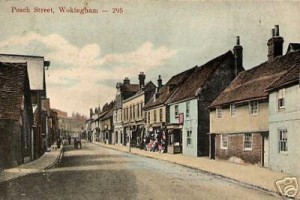
Post card of Peach Street Wokingham which includes 52 Peach Street (blue house) Photo from the Goatley Collection
We’re very grateful for the article provided by Diane Johansen in which she tells us about her Great Grand Uncle’s life and his death in Peach Street, Wokingham. We so often know about the buildings and the community who lived in Wokingham, but rarely discover the individual lives, their triumphs and their tragedies. Here we have just that with the story of George Henry Price
George Henry PRICE, my great-grandmother’s brother, was baptised at Lyonshall Parish Church, Herefordshire on 25th January l857, the son of Charles and Susannah PRICE. Charles was a pit sawyer and the family lived in a small village called Holmes Marsh. It sounds a delightful place – and, indeed, today, it is a “picture postcard” area – but back then it was quite a different place, and a newspaper article I have found tells of the reputation Holmes Marsh once had! Apparently, the local children from the neighbouring Lyonshall village were told “to avoid the place”. “If the mists from the marshes didn’t get them then the residents would…….!”
George Henry’s ancestral family had lived in Herefordshire as far back to the 1700s as I have managed to research, however, at some point in the 1870s, with agricultural work hard to find, the family went their separate ways. Where all the others moved to South Wales to seek employment in the mines and iron foundries, George Henry headed south; perhaps lured by the offer of work in the open air and milder climes. It cannot have been easy for him to know that his father continued to work in the heat of the foundries, well into his seventies. I doubt from what I know that George Henry ever saw his parents or brothers and sisters again.
I do know that, by 1879, George Henry was living in Chain Street, Reading, as in that year, he met and married Emma Sims from Brigmerston, Milton, Wiltshire. They married at St Mary’s Parish Church in Reading on 11th December 1879. His marriage certificate gives his age as 27, however he was actually only 22. As Emma was 29, George Henry may have felt more comfortable with a smaller age difference…and, anyway, if it pleased him to convince Emma he was just a little older than he was, what would it matter? Another small encouragement to marry on that cold winter’s day could well have been the rather imminent arrival of their first child! As we well know, the first child always arrives a little quicker than the others….
Emma was one of four sisters born to William and Ann Sims in Milston, Wiltshire. Rhoda may have been the first sister to move to Wokingham from Wiltshire. In 1870 she had married Stephen Bristow (also Wiltshire-born) in Reading and they and their family settled in Champions Road, Caversham. It is likely that Rhoda subsequently found work for her sister Elizabeth, who, in 1871, had moved to Wokingham to work as a housemaid for Edward Roberts, a local magistrate. At this time, Emma was still back at home in Wiltshire however she, too, would soon arrive in Reading where she was to meet George Henry.
Later that year, Elizabeth Sims set her own seal on remaining in Wokingham when she gave up working for the local magistrate and married Robert Green, a master dairyman and a widower, who had a young daughter Lucy. The new family initially lived at “The Grocer’s Shop” in Peach Street. Robert also had an infant son, John, who was born in 1870 so it is likely that Robert’s first wife died in childbirth. For the first few months of his life, baby John lived with the Wake family in Rose Street, Wokingham, however, with Robert’s marriage to Elizabeth he was able to reunite his family.
The fourth sister, Sarah Sims, was also tempted to join her sisters in Wokingham and, after Elizabeth left her employ with Edward Roberts, Sarah came to work for him and his wife Ellen. In 1881 Sarah married a local gardener, Edwin Rattue, (also Wiltshire-born) however, it would appear they then made the decision to move back home to look after Sarah’s widowed and now poorly mother.
In 1881, Robert and Elizabeth Green were running their grocery shop next door to the business that had now become George Henry and Emma’s Poultry and Game Shop at 52 Peach Street. George Henry was now the proud father of a one-year-old son, Frederick Sims Price, who was born in Caversham, where Emma’s married sister, Rhoda Bristow, was then living.
Within ten years, Elizabeth and Robert Green had moved up the road to 88 Peach Street, from where they ran their dairy. Lucy Green, now 22, and her brother John, 20, were working for their father as assistant dairymen. Within 5 years, Robert had died and Elizabeth, his widow, took over the dairy. She died in 1904. Robert has a headstone at All Saints Church and, although Elizabeth is not mentioned on it, it is likely she is buried there too.
It is clear that the attractions of Wokingham were too strong and that Sarah and her husband Edwin Rattue eventually returned from Wiltshire to the town as they are also buried at All Saints – Edwin in 1920 and Sarah in 1925.
Rhoda’s husband Stephen died in 1900. They had ten children and, sadly, one of their sons, Harry (b.1883) died during WW1. He is remembered with honour at Reading (Caversham) Cemetery where he has a grave. He died on 21st December 1916 (Reg. No. 32420, “G” Company, Royal Engineers.)
I was given a selection of newspaper articles which mention George Henry through the years:
Reading Mercury Sat. 17th May 1884: Edwin BRANT a boy of Wokingham, was charged with stealing a knife, value one shilling, the property of G H Price, poulterer of Peach Street, on 14th instant. He pleaded guilty and was committed to one month’s hard labour.
Reading Observer Sept. 26th l885: Fall of a Chimney….Tuesday 22nd morning, as Mr Seaward was sweeping Mr Bedford’s chimney in Peach Street, part of the roof fell. Mr Price, passing at the time with a horse and cart, narrowly escaped falling brickwork…..
1889, September Parish Magazine: Mr Price, Poulterer of Peach Street, whose leg was broken by a horse jumping on him, is doing well and will soon be able to resume business. He speaks gratefully of the skill and kindness which have been bestowed on him at Hospital and of all the comforts he has enjoyed there. He and Mrs Price also desire to return their warmest thanks to many friends and neighbours who have shown kind interest.
1889, Berkshire Chronicle Nov. 9th page 8: Wokingham Town Council – Survey Committee agreed to recommend that Mr Price be allowed to place a bow-window to his shop in Peach Street on condition he pay a Quit Rent of l shilling p.a.
Trade Directories: 1883, l887 and l895 – PRICE, Geo. Henry, Poulterer Peach St.
Saturday 5th April 1902 in Reading Mercury:
“Good Cob wanted, 14 hands Price, Poulterer, 52 Peach Street, Wokingham”
Friday 14th November 1919 in Western Gazette:
“Wanted for Christmas trade, 60 good fat turkeys, also geese. Highest price given, G H Price, 52 Peach St. Wokingham.”
By 1891, George Henry and Emma had a further seven children, all born in Wokingham:
- Annie, b. l882,
- Susan, b. l883,
- Arthur, b. l884,
- Elizabeth, b. l885,
- Louisa, b. l887
- Ethel, b. l890 and
- Emily b. 1892
(I believe all the children would have been baptised at All Saint’s Wokingham, as George Henry was a sides-man there.)
I located the family on the 1901 Census still living at Peach Street, however, I noticed that their eldest son Frederick was missing from home. Further research sadly showed that he had died, aged just 18 in 1898. Searches of the local newspapers found the answer: (Taken from Reading Observer, Berkshire Chronicle and Reading Mercury 19th March 1898)
A distressing accident happened at the Railway Station on Monday. Frederick Sims Price, the son of Mr Price, Poulterer, of Peach Street Wokingham, was helping to push a truck and, in the process, his clothes caught. He was crushed so severely that he died from the effects. Mr W. Weedon, the coroner, held an inquest at the Royal Berks Hospital on Thursday when the following evidence was given:
George Henry Price said he was father of the deceased who was 18 and working with witness. Occasionally his duties took him to Wokingham Station. He had no occasion to go there on the day of the accident. On Monday evening he was brought home in a fly. He told witness he was helping to push a truck and when doing so was told to go to the other side of it. When there his clothes were caught and he was twisted up. The doctor advised his removal to the Hospital as quickly as possible and he was taken there the same evening.
Harry Street, head porter at Wokingham Station, said he knew the deceased. He was often at the station enquiring for parcels. Witness had never before known him to help in moving trucks. He did not know how the deceased came to do so on that occasion. They were all pushing from the back. There was a dock wall and it was very dangerous there. No one knowing his work would push from there. From where the accident happened deceased must have come from the front of the truck. He had no business there. After the accident he came from between the dock wall and the carriage, a space of l4 inches and between the wall and the footboard 7 inches. About 8 0’clock that evening deceased saw the booking clerk about a little account. The accident happened about half an hour after. It was very dark. There was no light after leaving the platform. The deceased was a very good and respectable young man.
Mr M.T. Stack, home surgeon at the Royal Berks Hospital, said deceased was admitted about midnight on Monday suffering from shock. He complained of abdominal pain. He ruptured his bladder, never rallied and died on Wednesday morning. It was a hopeless case. He was operated upon, but at the time it was found to be of no use.
James Lancaster, signalman at Wokingham Station, said he was helping to push the truck. There were only five of them so far as he could see and they were all pushing from the back. A verdict was returned of “Died of shock, arising from his being accidentally crushed at the Wokingham Railway Station”.
This article was subsequently printed in the Reading Observer 26th March 1898 page 8:
A Volunteer’s Funeral took place on Saturday (19th)…the elements in accord with the sadness of the occasion, the rain commencing to fall about an hour previous to the time fixed for the interment and continuing throughout the whole proceedings. The cortege started from the house of the parents, the Wokingham Town Band leading and playing the “Dead March” in Saul Members of the Volunteer Corps, of which deceased had been a member, came next, Sergt-Instructor Hanney being in command, then the Hon. Instructor Mr Harvey, Lieut A Priest and the sergeants of the Boys Brigade. Next the corpse in a coffin of polished elm covered with the Union Jack, 4 Volunteers as bearers. The relatives followed, also the Juvenile Oddfellows Committee. Canon Sturges conducted the service…the church and streets were thronged with sympathisers.
The fallen headstone for Frederick Sims Price at All Saints, Wokingham which reads:
In loving memory of Frederick Sims Price who died March 16th 1898 in the 18th year of his age.
“Gone from us but not forgotten
Never shalt thy memory fade
Loving thought shall ever linger
Round the spot where thou art laid”
According to the 1911 Census, George Henry and Emma were still in Peach Street, living with their remaining son Arthur, who was a fly proprietor (horse and carriages), and daughters Susan and Emily. Ethel was working as a teacher, living with the Freer family in Hungerford and Louise had moved to London, where she was working as a clerk in Marylebone. Elizabeth, now 24, was working as a baker’s shop assistant for the Russell family at Station Parade, Enfield. George Henry’s later obituary would indicate that he was a “well-known and respected Poulterer and Livery Proprietor, who had carried on business for many years in Wokingham and who had also served as a sidesman at All Saints Church.”
On a visit to Wokingham in 2006, I found George Henry and Emma’s headstone at All Saints’ Church and this gave me his date of death. However, it did not tell me the whole story. Whilst I now knew that Emma had died in 1918 and George Henry in 1925, the circumstances of his death would sadly become apparent.
Subsequent research located George Henry’s inquest in the Reading papers as follows:
Inquest held on Wednesday 8th April 1925 by Coroner, R.S. Payne relating to the suicide of George Henry Price on Tuesday 7th April. Identification was given by Miss Emily Price, his daughter, who reported that her father “had been very depressed and on the verge of a nervous breakdown”. She found him “… in a shed at the rear of his residence”. A neighbour, Tom Herring, tried artificial respiration without success.
The account reported that George had had a nervous breakdown several years before. His doctor, H.F. Curl, said he had attended George frequently and found him in a “depressed state”. His relatives were very anxious about him and arrangements had been made to take him to a nursing home.
The newspaper account refers to Mr Price as a “well-known and respected tradesman” who had “carried on business for many years as a “poulterer and game dealer”. The doctor added that he had attended Mr Price for Bronchitis and he “rather thought that Mr Price had overheard him say that he would visit again in the afternoon and, having already been in an asylum some years before probably thought that he would be signed up again”.
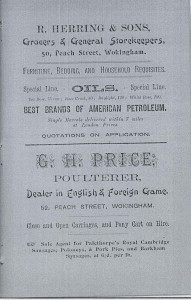
An Advertisement taken from Wokingham Parish Magazine. Note the inclusion of Mr Herring who tried to rescue Mr Price.
According to the Reading Mercury dated 11.4.1925: “The tragic death of Mr Price removes a familiar personality from the town and neighbourhood. At the Wokingham and Bracknell weekly markets he was well known. He served for many years as a sides-man at All Saints Church. He carried on, in addition to the poultry business, that of Livery Proprietor, and his service of horses and vehicles in that respect was most reliable. His wife died some time ago and his eldest son met his death by being crushed by a railway guard’s van in the shunting dock at Wokingham station many years ago. A son and six daughters – all of adult age – survive him”.
Inquest Verdict: “Suicide whilst of unsound mind”.
In George Henry’s Will of 1925, he bequeathed the shop and business to his son Arthur, however, by this time, Arthur had moved to Hounslow where he was settled and so, in 1926, the shop was sold to Henry Bowyer whereupon it became a corn chandler’s. His daughters were all mentioned in the Will, however Emily received a special word of thanks “in recompense for her kind care.”
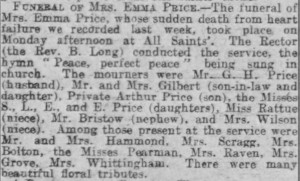
Emma’s sudden death may have triggered George’s visit to the asylum for his depression (click on image to increase size)
Eighty years after this event, I, as a member of his family, was much saddened to discover the story surrounding George Henry’s passing however I do feel that the overriding message in his story is one of a life of achievement and good works. From humble beginnings, in a small Herefordshire village, with few prospects, he worked his way up in the world to owning his own property and business – all the while providing for his family whilst suffering from an inner turmoil. Clearly, the death of his son – and the shock of it – must have contributed to George Henry’s mental health. It may be no coincidence that my own Great-Grandmother Susannah, George Henry’s sister, died some years before him, suffering from a similar malaise brought on by the loss of two of her own much-loved daughters. It would be easy to look upon the family as having a “weakness of mind” however I prefer to look upon it as a family who knew great love for each other, so much so that the coping with the loss of those loved ones simply became too great a burden to bear.
I shall not continue here with any additional information on George Henry’s descendants, but would be happy to correspond with anyone connected to the family. I would, of course, welcome any additional information on George Henry’s life in Wokingham….and maybe, just maybe, we will one day find a photograph of him.
Diane Johansen
16.08.2015

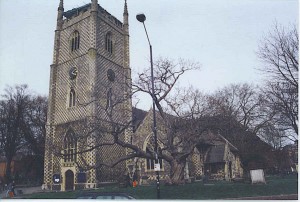
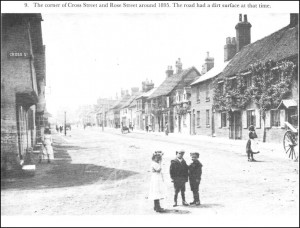
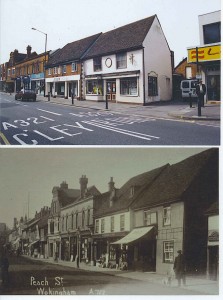
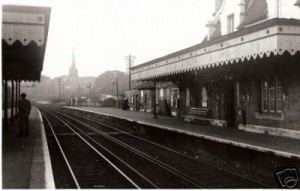
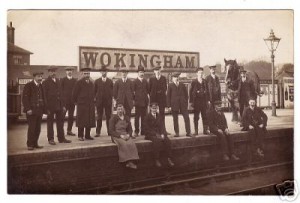
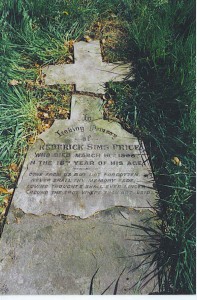
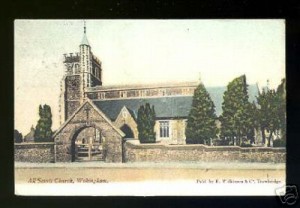
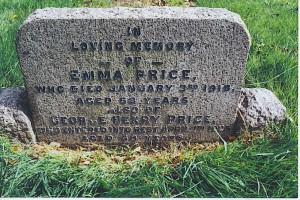
A wonderful story, I learned a little from my late father Denis Gilbert about his grandfathers poulterer shop. The one thing that has stuck in my mind over seven decades was that he had a talking Magpie in a cage outside of the shop. According to Dad he would call out to the passing ladies, “Want a Chicken Mrs” I have every reason to believe this was true.
Sounds rather a plucky fellow. Thanks for sharing the memory. I was reading a piece about shop habits in London during the 1600’s. Apparently there was the constant noise of bells being rung. When a person walked past a shop the keeper had a bell outside on a string which he would ring to get their attention!